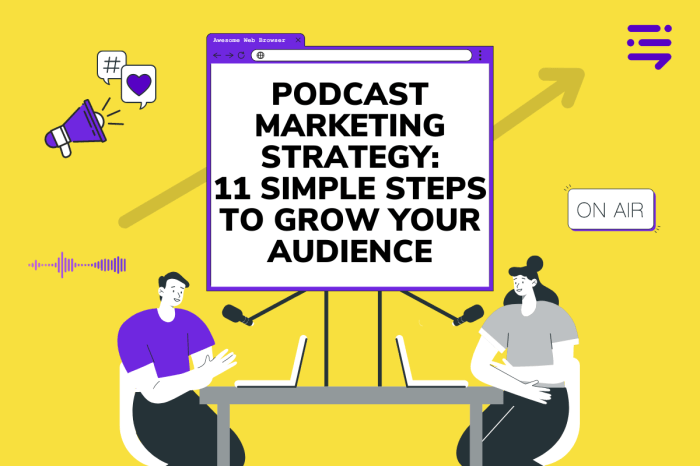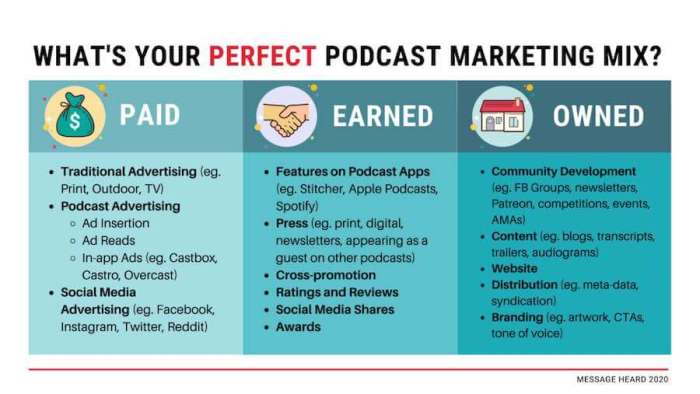Developing a Podcast Marketing Strategy sets the stage for a dynamic journey into the world of podcasting, where creativity meets strategy in a harmonious blend of innovation and impact.
Get ready to explore the ins and outs of podcast marketing, from understanding the landscape to measuring success, in a narrative that’s as engaging as it is informative.
Understanding the Podcast Landscape

Podcasts have exploded in popularity in recent years, with millions of listeners tuning in to a wide variety of shows. Let’s dive into the current podcast market and explore the different genres and benefits of podcast marketing.
Popular Podcast Genres and Audience Demographics
- True Crime: True crime podcasts have a large following, attracting both male and female listeners who are intrigued by real-life mysteries and investigations.
- Comedy: Comedy podcasts cater to a younger audience looking for entertainment and laughs, with a mix of scripted and improvisational humor.
- News and Politics: These podcasts appeal to individuals interested in staying informed about current events, with a diverse demographic spanning different age groups and political beliefs.
- Lifestyle and Self-Improvement: Listeners seeking personal development and wellness tune into podcasts that offer advice on relationships, health, and productivity.
Benefits of Podcast Marketing
- Targeted Audience Reach: Podcast marketing allows businesses to reach niche audiences interested in specific topics, resulting in higher engagement and conversion rates.
- Authenticity and Trust: Podcast listeners often develop a strong connection with hosts, making them more receptive to sponsored content and recommendations.
- Long-Lasting Impact: Unlike traditional ads, podcast ads have a longer shelf life as episodes are often listened to repeatedly, increasing brand exposure over time.
Setting Podcast Marketing Goals
Setting clear goals for a podcast marketing strategy is crucial for guiding your efforts, measuring success, and staying focused on what really matters. Without clear goals, it’s easy to get lost in the noise and lose sight of your objectives. Here are some key points to consider when setting podcast marketing goals:
Importance of Setting Clear Goals
- Having clear goals helps you define what success looks like for your podcast.
- Goals provide a roadmap for your marketing efforts and help you prioritize tasks.
- Clear goals make it easier to measure the effectiveness of your strategies and make adjustments as needed.
Examples of Specific Goals
- Increasing Listenership: Setting a goal to increase the number of downloads or subscribers to your podcast.
- Brand Awareness: Focusing on increasing brand recognition and visibility through your podcast.
- Lead Generation: Using your podcast as a tool to generate leads and drive conversions for your business.
Aligning Podcast Marketing Goals with Business Objectives
- Start by identifying your business objectives and how your podcast can support them.
- Ensure that your podcast marketing goals are in line with your overall business goals and objectives.
- Regularly review and adjust your podcast marketing goals to ensure they align with the changing needs of your business.
Defining Target Audience: Developing A Podcast Marketing Strategy

Identifying and defining a target audience for a podcast is crucial for its success. This process involves researching and understanding the demographics, interests, and behaviors of potential listeners to tailor content and marketing strategies effectively.
Understanding the Target Audience
To create a successful podcast, it is essential to understand the target audience and how they consume content. By defining the target audience, podcast creators can tailor their episodes to meet the specific needs and preferences of their listeners. This approach allows for the development of content that resonates with the audience, increasing engagement and loyalty.
- Research demographics: Conduct market research to determine the age, gender, location, income level, and other relevant demographic information of your target audience.
- Identify interests and behaviors: Understand the interests, hobbies, preferences, and behaviors of your target audience to create content that appeals to them.
- Create listener personas: Develop detailed listener personas that represent different segments of your target audience, including their likes, dislikes, and motivations for listening to podcasts.
Influencing Content Creation and Marketing Strategies
Understanding the target audience directly influences content creation and marketing strategies. By knowing who the audience is, podcast creators can tailor their episodes to address specific topics, formats, and styles that resonate with listeners. This targeted approach increases the chances of attracting and retaining a loyal audience.
- Content customization: Develop content that speaks directly to the interests, preferences, and needs of the target audience to keep them engaged and coming back for more.
- Marketing alignment: Align marketing strategies, such as social media promotion, collaborations, and advertising, with the characteristics and behaviors of the target audience to maximize reach and impact.
- Feedback integration: Use audience feedback and engagement metrics to continuously refine content and marketing strategies to better serve the target audience.
Importance of Audience Segmentation and Personalized Messaging
Audience segmentation and personalized messaging are essential components of successful podcast marketing. By segmenting the audience based on demographics, interests, or behaviors, podcast creators can deliver personalized messages that resonate with each segment, fostering a stronger connection and engagement.
- Segmentation benefits: Audience segmentation allows for tailored content and messages that cater to the specific needs and preferences of different listener groups, increasing relevance and impact.
- Personalization advantages: Personalized messaging creates a more intimate and engaging experience for listeners, fostering loyalty and word-of-mouth promotion within target segments.
- Retention and growth: By segmenting the audience and delivering personalized messages, podcasts can improve listener retention rates and attract new listeners who resonate with the tailored content and messaging.
Content Creation for Podcast Marketing
When it comes to creating engaging podcast content that resonates with your target audience, it’s important to keep a few key tips in mind.
Storytelling Techniques
- Begin with a captivating hook to draw listeners in.
- Use personal anecdotes or real-life examples to make your content relatable.
- Create a narrative arc that keeps listeners engaged from start to finish.
Interview Formats
- Prepare thoughtful questions that encourage insightful responses from your guests.
- Allow for natural conversation flow and follow-up on interesting points raised.
- Edit interviews for clarity and to remove any unnecessary distractions.
Educational Content Strategies, Developing a Podcast Marketing Strategy
- Break down complex topics into digestible segments for easy understanding.
- Incorporate examples, case studies, and practical tips to enhance educational value.
- Encourage listener participation through Q&A segments or interactive elements.
Repurposing Podcast Content
Repurposing podcast content for marketing across different channels can help maximize your reach and engagement.
- Convert podcast episodes into blog posts or articles for your website.
- Create social media snippets or teasers to promote upcoming episodes.
- Compile themed playlists or highlight reels to attract new listeners.
Promotion and Distribution Strategies
Promotion and distribution are crucial aspects of podcast marketing to reach a wider audience and build a loyal following. Utilizing various channels and strategies can help increase visibility and engagement with listeners.
Social Media Promotion
Using social media platforms like Instagram, Twitter, Facebook, and LinkedIn can be effective in promoting podcasts. Share snippets of episodes, behind-the-scenes content, and engage with followers to create a buzz around the podcast.
Email Marketing Campaigns
Implementing email marketing campaigns can help reach a targeted audience interested in podcast content. Sending out newsletters with episode highlights, guest interviews, and upcoming topics can keep subscribers engaged and informed.
Collaborations and Cross-Promotion
Collaborating with other podcasters or influencers in the same niche can expand the reach of the podcast. Cross-promotion through guest appearances, shoutouts, or joint episodes can introduce the podcast to new audiences and create a sense of community among listeners.
Importance of Optimization
Optimizing podcast titles, descriptions, and episode tags with relevant s can improve discoverability on search engines and podcast directories. Utilizing best practices can increase visibility and attract organic traffic to the podcast.
Engagement Tips for Building a Community
Interacting with listeners through comments, surveys, and live Q&A sessions can foster a sense of community around the podcast. Creating exclusive content for loyal fans, hosting events, and responding to feedback can increase listener engagement and retention.
Measuring Success and Analyzing Results
In order to determine the effectiveness of a podcast marketing strategy, it is essential to measure success and analyze the results. This involves identifying key performance indicators (KPIs), tracking analytics, and making data-driven decisions for optimization.
Key Performance Indicators (KPIs)
- Number of downloads: This metric indicates the reach of your podcast and the level of audience engagement.
- Listener retention rate: Understanding how many listeners continue to tune in to your episodes can provide insights into the quality of your content.
- Conversion rate: Monitoring how many listeners take action after listening to your podcast, such as visiting your website or making a purchase, can help measure the effectiveness of your marketing efforts.
- Social media engagement: Tracking shares, comments, and likes on social media platforms can indicate the level of audience interaction and interest in your podcast.
Tools and Methods for Tracking Podcast Analytics
- Podcast hosting platforms: Platforms like Podbean, Libsyn, and Buzzsprout offer analytics tools to track downloads, listener demographics, and engagement.
- Google Analytics: Integrating Google Analytics with your podcast website can provide valuable insights into website traffic, audience behavior, and conversion rates.
- Social media analytics: Platforms like Facebook Insights, Twitter Analytics, and Instagram Insights can help track engagement and audience demographics on social media.
Analyzing Results and Making Data-Driven Decisions
- Identify trends: Look for patterns in the data to understand what is working well and what can be improved in your podcast marketing strategy.
- Experiment and iterate: Based on the data analysis, make adjustments to your content, promotion strategies, or target audience to optimize results over time.
- A/B testing: Test different approaches, such as episode formats, promotional tactics, or call-to-action strategies, to determine the most effective methods for engaging your audience.